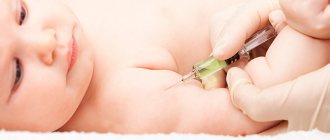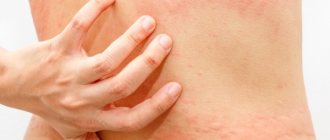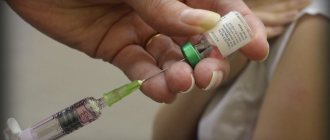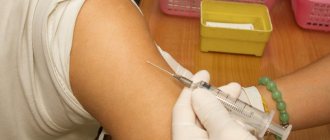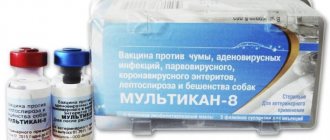What is the DPT vaccine for?
DTP vaccination is an adsorbed pertussis-diphtheria-tetanus vaccine. All three diseases that it protects against are caused by bacteria that produce toxins and attack the human body. Vaccination cannot protect against bacterial infection - it is aimed at neutralizing toxins.
Vaccine composition
The DPT vaccine contains components of three bacteria: Bordetella pertussis (causes whooping cough), Corynebacterium diphtheriae and Clostridium tetani (causes diphtheria and tetanus, respectively).
The pertussis component of the vaccine is represented by whole microbial cells, previously “killed” by formaldehyde. To protect against diphtheria and tetanus, the vaccine includes separate purified diphtheria and tetanus toxoids, which are obtained from the bacteria that cause these diseases. Thus, DTP is an inactivated vaccine. It may not provide as much protection as live, attenuated vaccines such as the measles vaccine, so it must be given multiple times.
Aluminum salts are added to DPT as an immune response enhancer (adjuvant). Antigens adsorbed on them provoke the development of humoral immunity.
Many people are afraid of the DPT vaccine because of its high reactogenicity. This is due to its pertussis component – whole cells of Bordetella pertussis. If for some reason your child cannot receive DPT, vaccination against diphtheria and tetanus can still be done. For this purpose, there are separate preparations of toxoids: AS - tetanus toxoid, AD - diphtheria toxoid and ADS - diphtheria and tetanus toxoids without pertussis component. Of course, ADS vaccination is more convenient, because then you will have to give fewer injections when receiving subsequent doses.
Vaccination schedule
DTP vaccination is included in the National Preventive Vaccination Calendar. The vaccination course consists of three vaccinations:
- at 3 months,
- at 4.5 months,
- at 6 months.
Then at 18 months, revaccination is carried out. If the schedule was violated, the doctor waits 12–13 months after the last DPT vaccination. If the DPT vaccine was not administered at all, the age of the child matters:
- if the child is under 3 years 11 months 29 days, DPT is administered;
- if older, but not yet 6 years old, the pertussis component is excluded and ADS toxoid is administered;
- for children over 6 years of age, ADS-M toxoid is used, in which the content of diphtheria toxoid is reduced.
Important! According to the vaccination schedule, children at 6-7 and 14 years of age must undergo a second and third revaccination against diphtheria and tetanus using toxoid preparations with a reduced content of the diphtheria component (ADS-M). In the future, revaccination against these diseases is carried out for all adults once every 10 years.
Revaccination of older children and adults against whooping cough is not carried out in Russia, although vaccination with acellular whooping cough vaccines is widely practiced abroad in children and adolescents, as well as pregnant women, starting from the 26th week of pregnancy, which helps protect infants under 3 months from the disease (for vaccination of older children age and adults use special preparations with a reduced content of diphtheria toxoid).
Consequences of drinking alcohol before and after vaccination
In this section we will not talk about children, but about adults, who, starting from 14-16 years old, are vaccinated every 10 years. Alcohol itself weakens the body's immune system.
And if we take into account the fact that the administered vaccine does the same thing, then we get a double load on the immune system. This exposure may result in side effects and complications.
Therefore, adults are not recommended to drink even weak alcoholic drinks the day before or during the week after vaccination.
Preparing a child for vaccination
Before vaccination, children are always examined by a pediatrician.
Photo: AllaSerebrina / Depositphotos The vaccine is administered intramuscularly; the procedure does not require any special preparation. However, DPT has contraindications. Some are worth paying attention to, others only create false impressions about the vaccine.
True contraindications include:
- allergy to vaccine components, which manifests itself in a strong general reaction or complications after the previous administration. These include: the first two days, temperature above 40 ℃, swelling more than 8 cm in diameter, developed Guillain-Barré syndrome (autoimmune disease);
- severe immunodeficiency;
- convulsions/fits and other diseases of the nervous system in a progressive process.
What conditions cannot be exempt from vaccination?
False contraindications to DTP vaccination:
- acute diseases (4 weeks after recovery), mild respiratory diseases (2 weeks after);
- chronic diseases (the main thing is to wait for remission);
- diathesis (beyond exacerbation);
- weight loss, prematurity;
- allergic diseases: local rashes, spasm of the respiratory tract with cough (bronchospasm);
- taking antibiotics;
- convulsions/allergic reactions to DTP in relatives.
What to choose: imported drug or domestic
Before choosing a vaccine from a foreign or domestic manufacturer, you need to understand how they may differ.
When choosing a vaccine, it is important to consider parameters such as:
- injection scheme;
- compound;
- reaction and possible side effects.
In the case where a child has a severe allergic reaction, it is better to give preference to foreign analogues. This is explained by the increased risk of developing a negative reaction to Russian DTP.
If we talk about the vaccination schedule, there are no differences. Vaccinations will be given according to the schedule presented by the National Vaccination Calendar.
Regardless of which drug is used, experts recommend preparing for vaccination in advance.
The list of preparatory activities includes:
- the child takes an antihistamine for three days;
- absence of colds, hyperemia, or any diseases.
Only a completely healthy child can be vaccinated, which will avoid possible negative consequences.
As for contraindications, there are no significant differences either..
Any company specializing in the production of DTP vaccines is maximally interested in the effectiveness of the drug and minimal risks for young patients. The main differences are only in price and possible manifestations of a negative reaction.
Each parent makes his own decision as to which vaccine to use: domestic or foreign.
According to statistics, even after using Pentaxim or Infanrix, there may be adverse reactions.
DTP analogues
Due to the frequency and severity of side effects associated with DTP, new, acellular drugs (ACDs) became widespread in the mid-1990s. All of them, like DPT, are combined with diphtheria and tetanus toxoids, but instead of whole pertussis bacteria they contain only individual pertussis antigens. Such vaccines are better tolerated and have completely replaced the DPT vaccine in many countries with a low risk of whooping cough infection. Many of the new cell-free drugs protect against 5 or even 6 infections at once:
- Infanrix hexa (6 infections, including hepatitis B, polio and Haemophilus influenzae),
- Pentaxim (5 infections, including polio and hemophilus influenzae),
- Tetraxim (4 infections, including polio).
Among the three-component BCVs: Infanrix for children and Adasel for adults (this vaccine has a reduced amount of diphtheria toxoid).
However, experts believe that the whole-cell vaccine protects better - there are more antigens, and the immune response is closer to natural infection. If we compare acellular vaccines, those with more pertussis antigens protect better.
When choosing between whole-cell drugs, in addition to DPT, you can pay attention to four-component ones, which also protect against hepatitis B.
Recommendations for caring for the injection site
After vaccination, the injection site does not require any complex care.
It is not wetted or rubbed with a washcloth or soap. If the skin at the injection site is swollen or red, do not touch the inflamed area. Usually this manifestation goes away within a week.
If the swelling bothers the baby a lot, you can make an iodine grid. If an accumulation of pus appears at the injection site, under no circumstances should you squeeze it out, as this can introduce an infection into the wound.
In such a situation, you should seek help from a doctor. It is possible that a similar reaction was caused by a cold abscess, the elimination of which requires medical intervention.
Which vaccine is better to choose?
Both domestic and foreign vaccine preparations against whooping cough are presented on the Russian market.
Photo: TTK TV channel In Russia, people are vaccinated with whole-cell DPT produced by the Federal State Unitary Enterprise NPO Microgen of the Russian Ministry of Health. Foreign acellular vaccines are also available:
- Belgian "Infanrix"
- French "Tetraxim" from SANOFI PASTEUR,
- French "Pentaxim" from SANOFI PASTEUR.
The Russian inactivated combined vaccine “Bubo-Kok” produced by CJSC NPK “Combiotech” also protects against hepatitis B. The first Russian 5-valent vaccine “aDTaP-HepB+Hib” or pentovaccine produced by FSUE “NPO Microgen” is already available. It protects against five common childhood infections: diphtheria, whooping cough, tetanus, hepatitis B and Haemophilus influenzae.
Pertussis vaccine for adults
Until recently, there were no pertussis vaccines for adults in Russia.
However, in 2021, the drug “Adasel” produced by SANOFI PASTEUR appeared on the domestic market (Fig. 1). This is an acellular vaccine with a reduced content of diphtheria component. The US Centers for Disease Control and Prevention (CDC) recommends giving Adasel to adults as a booster dose to re-prime the body's immune response. The drug can also be administered to children, but again for revaccination, and not as a first dose. Pregnancy is not a contraindication for vaccination. The CDC offers pregnant women the same acellular Adasel. It is introduced at the beginning of the third trimester. In Russia, such vaccination is not practiced, although studies indicate there is no evidence of a risk to pregnancy. In America, this drug is administered before each pregnancy, even if there is a year or two between them. Children in the first months of life are susceptible to whooping cough; if the mother has not been vaccinated, they are defenseless against infection.
Figure 1. Adasel vaccine. Source: NSW Health
What to do after vaccination
It is important to monitor the condition of the body after vaccination. Their parents do this for their children. Mild side effects are more likely a good sign that the body has begun to work on its immune response. It is necessary to spend at least half an hour near the vaccination room in case of unexpected severe reactions.
The main thing is not to panic when normal passing reactions appear. You can ask your doctor in advance about antipyretic and antihistamine medications for children. On the 3rd day after vaccination, the appearance of any reactions is uncharacteristic.
How to prepare
The risk that a child will have a strong reaction to a vaccine is quite high. Therefore, you need to prepare for the procedure. There are a number of conditions that must be observed:
- immunization is performed on an empty stomach;
- on the day of vaccination, the baby must be healthy;
- Before leaving, you need to empty your bowels;
- The child should be dressed according to the weather.
Vaccination is carried out against the background of the use of antipyretic medications (Nurofen, Paracetamol, Ibuprofen). The risk of side effects is thus significantly reduced.
In addition, you need to give your baby antihistamines to help prevent the development of allergies.
Preparation for vaccination is carried out according to the following scheme:
- five days before vaccination, antihistamines (Fenistil, Erius) are started;
- three days before visiting crowded places is excluded;
- you need to consult a neurologist in advance;
- blood and urine tests are taken to rule out possible contraindications;
- examination by a pediatrician.
Only by following these rules will it be possible to avoid unwanted reactions..
It is also extremely important to follow medical recommendations in the post-vaccination period:
- do not walk outside for a day;
refuse water procedures for one day;- avoid mechanical impact on the injection site;
- drink enough fluid;
- it is prohibited to introduce new foods into the diet;
- give antihistamines for three days;
- when the temperature rises, give the baby antipyretics;
- avoid crowded places during the post-vaccination period;
- It is forbidden to treat the injection site with antibacterial agents, ointments, solutions;
- avoid overheating and hypothermia;
- Monitor the condition of the baby; any changes are a reason to consult a pediatrician.
By following these recommendations, you will be able to help your baby avoid unwanted side reactions and complications.
What not to do after DTP vaccination
It is better not to engage in physical activity, because an enemy has entered the body, albeit inactivated. The body’s task is to develop cells that will resist this enemy. Therefore, in the first few days you should ensure yourself peace. However, if the child feels well, then walking is not contraindicated.
It is also not recommended to change the diet of a child or a nursing mother. This can lead to additional stress on the intestines, and therefore on the entire body.
Can I go to kindergarten?
This is a very pressing issue, since most parents do not have the opportunity to stay at home and miss work days. In fact, if such an opportunity exists, it is better to take advantage of it.
Not all children in the kindergarten group are healthy. By communicating with them, the baby can easily become infected with other infectious or colds. Therefore, for safety reasons, it is better to postpone going to kindergarten for at least one day.
Complications after vaccine administration
DTP vaccination can cause prolonged crying in children.
Photo by Laura Garcia: Pexels Complications after vaccination that require seeking medical attention include:
- allergic rash (not local),
- more than 3 hours of uncontrollable screaming and crying,
- swelling of the face and throat,
- labored breathing,
- cardiopalmus,
- dizziness, nausea and weakness.
In the 1970s, the use of whole-cell DTP vaccine was associated with encephalopathy in children. However, numerous studies have proven the absence of this connection.
When is it better to refuse imported vaccines?
Vaccination is strictly contraindicated if:
- hypersensitivity to the components included in the composition;
- abnormalities in the nervous system;
- hepatitis and tuberculosis;
- impaired blood clotting;
- acute pathologies of infectious and non-infectious origin.
Also contraindicated are the presence of high fever, nausea, vomiting and diarrhea.

